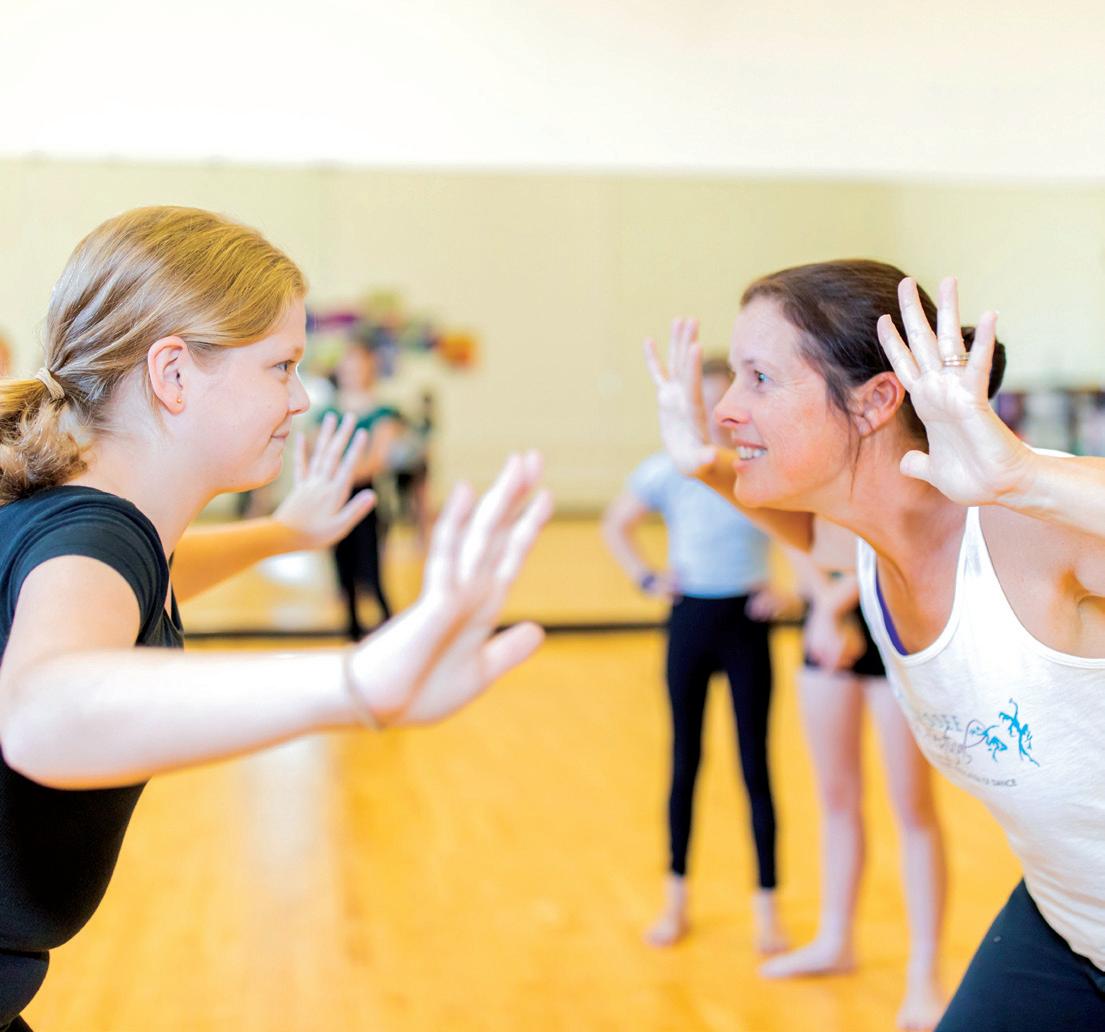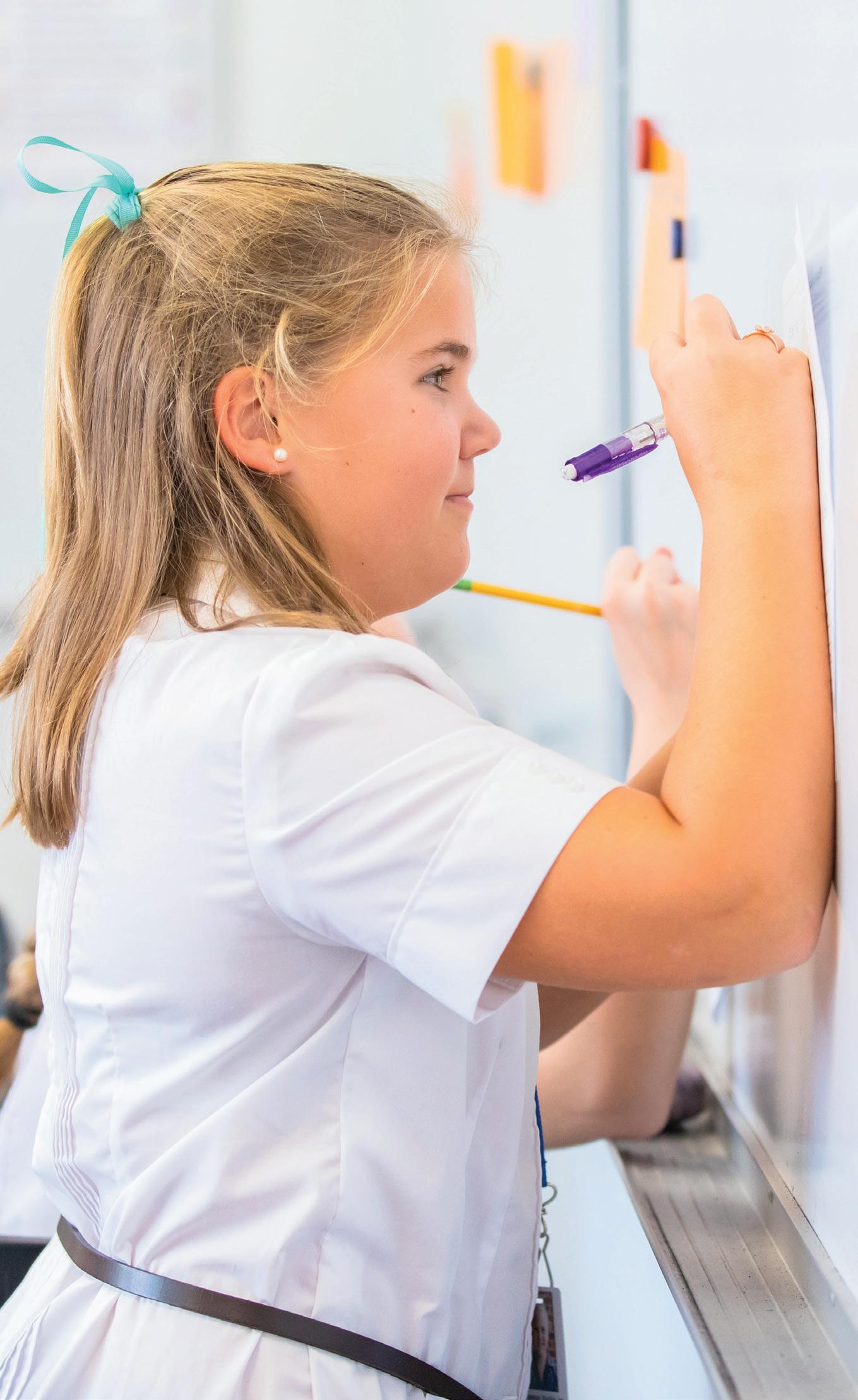
5 minute read
Supporting Her Along The Way
For Girls, Relationships Matter
For many, success in school is measured by GPAs, athletic trophies, or popularity. But at an all-girls school, relationships provide an immeasurable boost to student success. We understand what girls need to succeed—healthy relationships to fuel learning. Ask any GPS girl, present student or alumna, what aspect of her GPS education matters most, and she will report friendships with schoolmates and relationships with faculty and coaches.* In more than a century teaching girls, we have seen evidence that supportive and caring relationships with teachers allow girls to achieve success in and out of the classroom.
*2018 student survey
As children experience positive relationships with teachers, they develop interests in school activities, are more motivated and willing to learn, and report higher academic achievement.
Source: 2016 study published by the US National Library of Medicine
Our Faculty
Following teaching methods and the best practices in educating girls, our faculty is committed to and passionate about nurturing and supporting girls in their intellectual and emotional development. GPS teachers inspire students to reach beyond their comfort zones and guide them as they discover who they are now and who they can become in the future.
Small-class settings allow teachers to not only know students as individuals, but also to recognize when they need more individualized support. This support extends beyond the classroom.
Whether on a grade-level retreat, in an advisory group, in an after-school theater rehearsal, or at practice, she will be surrounded by teachers and coaches who make her feel safe to ask questions, take risks, to fail and try again, and to believe she can accomplish anything.
80% Of All Faculty Hold Advanced Degrees
8:1 Student:Teacher Ratio
17% Of All Teachers Are GPS Alumnae

—LAUREL MOORE ZAHROBSKY’90, DANCE TEACHER
Support Services
Students also have access to our Support Services Team, which includes the GPS Learning Center (with faculty learning specialists and peer tutors) and counseling services. While counselors address social and emotional needs, learning center specialists reinforce skills and provide instruction to support the learning styles and needs of any girl who requires assistance, including girls with documented learning profiles. The Support Services Team also plays a key role in facilitating communication between students, teachers, parents, and other key players to help her realize her highest academic potential.
Any girl is welcome at Homework Help Club, an opportunity offered after school each day and staffed by one of our Learning Specialists. This resource allows girls to receive additional support and guidance on her daily homework.
Our Support Services Team
Middle School Counselor (Licensed Clinical Mental Health Counselor) | Licensed School Psychologist | Learning Specialists | Licensed Special Education Teacher

Advisory
From sixth grade to senior year, girls are placed in an advisory group led by a faculty member. (Beginning her sophomore year, she will remain in the same advisory group until graduation.) During advisory, she will participate in activities and discussions designed to support her socioemotional growth. Advisory groups also provide a time to dig deeper into discussions prompted by special speakers.
Grade-Level Advisory Themes
Sixth: Learning the Ropes | What does it mean to be a GPS girl? What pieces look “the same”? What pieces are different for you?
Seventh: Living the Middle | How do you self-advocate and take initiative? How do you grow as a student, a self-advocate, and as a positive community member throughout the year?
Eighth: Leading the Way | What does leadership look like? How do you lead others in our community? How do you support other members of a group?

Encouraging Self-Advocacy Through Student-Led Conferences
Authentic self-advocacy begins when a girl learns to use her voice in an environment where she feels safe and supported. During student-led conferences, along with her advisor, girls personally relay their progress. Beforehand, students take time to consider their academic progress so they can articulate what has been both successful and challenging for them to-date and how they can use each experience as an opportunity for growth. This self-evaluation process is crucial as girls take on more ownership of their learning journey. Parents benefit from hearing directly from their daughters and having another point of connection to her GPS experience.
—ANNIE LOVELESS SOLLMAN’02, MIDDLE SCHOOL MATH TEACHER

Preparing Her for School and Life
The Middle School years are a time of many changes in the life of a girl. It is important that she be equipped to understand and process the emotional, physical, and social aspects of adolescence and be constantly supported along the way.
At GPS, preparation in life and study skills is an integral part of the Middle School program and a crucial part of preparing girls for a lifetime of emotional and physical health.
SIXTH-GRADE SKILLS COURSE | This course introduces skills essential for being a successful sixth-grader and Middle School student at GPS. Students will work on staying healthy, managing stress and anxiety, communicating effectively with peers and teachers, resolving conflict with peers and parents, using social media and technology appropriately, and maintaining self-esteem. Topics Covered: peer relationships, study skills, organization, self-awareness, personal hygiene, and how our brains and bodies work.
SEVENTH-GRADE HUMAN GROWTH AND DEVELOPMENT | The next step in the health and wellness curriculum, Human Growth and Development, teaches students how their brains and bodies change and about human reproduction. Students explore adolescent emotions, practice resolving conflict, and identify choices that nurture their bodies and brains through nutrition education and proper hygiene practices. An emphasis is placed on self in the context of relationships. Objectives Include: self-awareness, self-care, self-esteem, boundary-setting, and finding balance.
EIGHTH-GRADE CHANGES AND CHOICES | This interactive class is designed to assist eighth-graders as they learn to make informed decisions based upon factual information and to identify and discuss ways to cope with their emotions and social pressure. The class encourages girls to have self-respect and to choose wisely as they encounter new freedom and experiences. Topics Covered: responsibility, respect for others, decision making, dealing with peer pressure, proper nutrition, effective communication, relationships, and appearance ideals and media.











